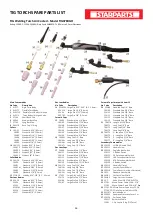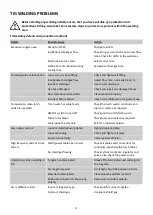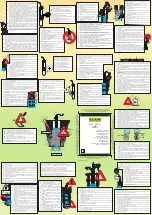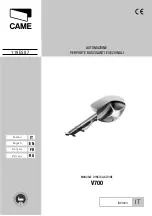
24
GUIDE TO TIG WELDING
Before starting any welding activity ensure that you have suitable eye protection and
protective clothing. Also take the necessary steps to protect any persons within the welding
area.
Arc starting
-
lift TIG (lift arc)
Not to be confused with scratch start, this arc starting method allows the tungsten to be in direct contact
with the work piece first but with minimal current so as not to leave a tungsten deposit when the
tungsten is lifted and an arc is established.
With lift TIG, the open circuit voltage (OCV) of the welder folds back to a very low voltage output when
the unit senses it has made continuity with the work piece. Once the torch is lifted the unit increases
output as the tungsten leaves the surface. This creates little contamination and preserves the point on
the tungsten although this is still not a 100% clean process.
The tungsten still can get contaminated but
lift TIG is still a much better option than scratch starting, for mild and stainless steel although these
methods of arc starting are not a good option when welding aluminium.
Arc starting
-
HF start
Non contact High Frequency (HF) start method is a high voltage and low amperage generated using a
spark gap assembly and is the most popular and generally considered best TIG arc starting method. The
High Frequency (HF) start generates a high frequency arc that ionizes the gas bridging the gap between
the tungsten point and the work piece.
This touch
-
less method creates almost no contamination unless
the tungsten has been over sharpened or the start amperage is too high. It is an excellent choice for all
material being welded especially aluminium although unless you need to weld aluminium, you don
’
t
have to use HF start steel/stainless.
The HF frequency varies with the spark gap and can be around 16000 Hz to 100000 Hz depending on
spark gap width so consideration should be given with this method as it can cause electrical interference
to nearby electrical equipment such as computers, CNC controls and phone systems.
If the spark gap is widened, the HF can become erratic.













































